Global Partnerships and Investments, crucial to leveraging technologies for Food Systems Transformation – AfDB, CGIAR and Stakeholders
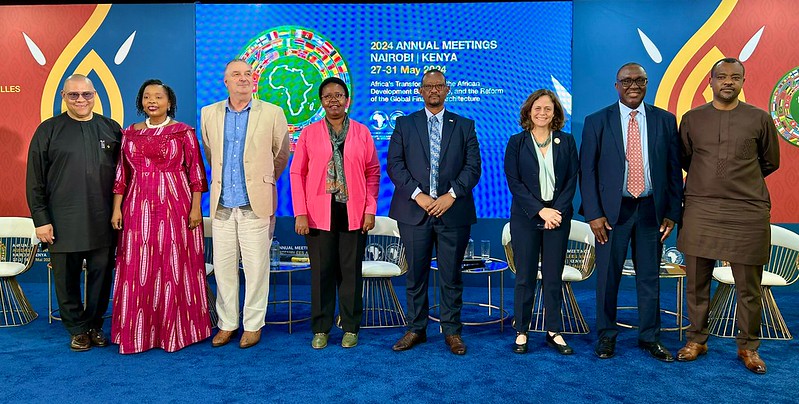
The African Development Bank, in collaboration with the CGIAR and Technologies for African Agricultural Transformation (TAAT) programme, held a side event on leveraging CGIAR technologies for agricultural Transformation in Africa during the 59th Annual Meeting of the African Development Bank and the 50th Meeting of the Board of Governors of the African Development Fund.
The event, which was held on 30th May 2024 at the Kenyatta International Conference Center (KICC) in Nairobi, Kenya, featured keynote remarks from Dr Akinwunmi Adesina, President of the African Development Bank and Prof Lindiwe Sibanda, Chairperson of the CGIAR System Board.
President Adesina highlighted the need for better-performing and more resilient agricultural technologies to address climate change challenges: “We need better-performing, more resilient agricultural technologies,” he said, stressing the significance of research and development (R&D).
He shared his extensive experience with various CGIAR institutions and underscored the necessity of supporting CGIAR to achieve global food security. “If we are serious about feeding the world, we must be serious about doubling, tripling support for the CGIAR.”
Africa has the technology to feed itself
The AfDB President recounted his advocacy for CGIAR, especially when its funding was threatened, leading to the development of the Technologies for African Agricultural Transformation (TAAT) initiative. He further provided examples of successful agricultural transformations, such as Ethiopia’s heat-tolerant wheat and drought-resistant maize in Eastern Africa, facilitated by CGIAR technologies.
“I have never in my 40 years plus of experience in agriculture, felt this confident that Africa has the technology to feed itself,” he stated.
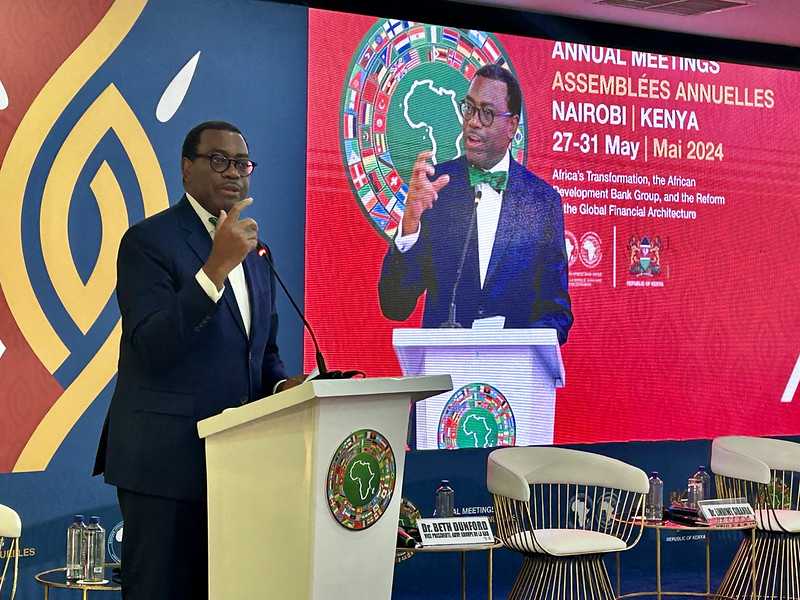
He called for strong political support and effective policy frameworks to scale these technologies, drawing parallels with the Green Revolution in Asia. “Africa should never be begging for food. There is no pride there,” he said, emphasising the importance of local and regional agricultural research collaboration, private sector involvement, and a focus on youth in agriculture to address the ageing farming population.
Dr. Adesina emphasised the need for value addition in agricultural produce to ensure economic growth and food security in Africa.
“65% of the uncultivated arable land left in the world, it’s not in Asia, it’s not Latin America, it’s not in Europe, it’s not in the United States, it’s not in Canada, it’s in Africa.” He added, “The highway to wealth is to add value to commodities and for that we need the private sector.”
CGIAR: a safe home for investments
Prof Sibanda, a practicing farmer and policy adviser to numerous African heads of state and governments, emphasised the enduring partnership between CGIAR and the AfDB in her opening remarks. She reflected on Dr Adesina’s ambitious “High 5s” initiative launched in 2015, which prioritised feeding Africa and demonstrated the transformative power of agriculture.
“We went to Dakar One in 2015 where we sealed the marriage of TAAT,” she recalled, highlighting the successful collaboration that led Ethiopia to become self-sufficient in wheat production. “That speaks to putting technology first,” she noted, expressing pride in the achievements of TAAT and the plans to scale up this partnership in the next decade.
She underscored the need for effective partnerships to scale impact. “We want to be a good partner,” emphasizing the role of local research and development, NGOs, and the private sector in reaching farmers. Highlighting the significance of neglected crops, she introduced the Vision for Adapted Crops and Soils (VACS) program, which focuses on “grandmother crops” with potential for nutrition and climate resilience.
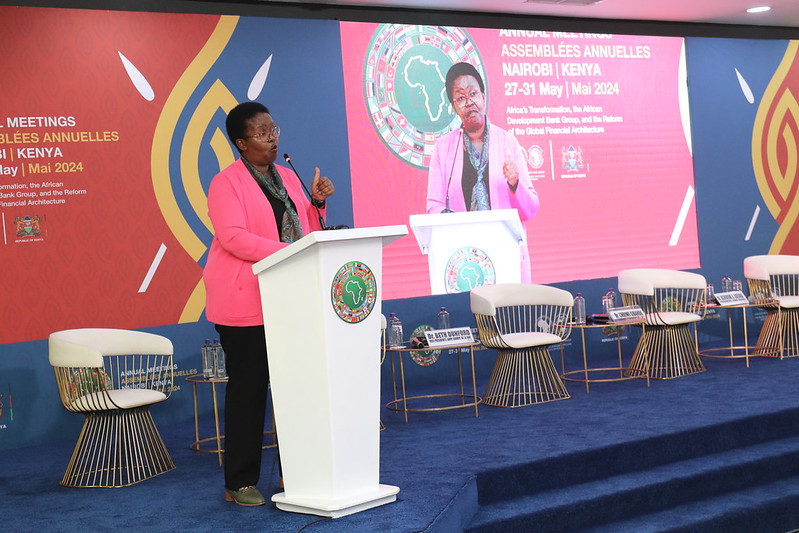
She concluded by addressing financing, with a $4 billion target to support CGIAR’s initiatives: “We are the safe home for your investment,” she assured, inviting partners to the Africa Science Week in July in Nairobi to showcase the impact of CGIAR and partner technologies.
Following the keynote and opening remarks, the first panel discussion on critical issues surrounding agricultural development, sustainability, and the role of partnerships in fostering innovation and growth across Africa ensued.
The panellists included Prof Lindiwe Sibanda, Honourable Dr. Uzziel Ndagijimana, Minister of Finance and Economic Planning, Rwanda, Dr. Daiho Fujii, Deputy Vice Minister of Finance, Japan, Dr Birgit Pickel, Director-General for Africa in the Federal Ministry for Economic Cooperation and Development (BMZ) representing the German Minister of Economic Cooperation and Development, as well as Governor of the Bank from Germany, and Dr Beth Dunford, Vice President of Agriculture, Human, and Social Development at the African Development Bank (AfDB).
The second panel session comprised Dr Beth Dunford, Vice President of Agriculture, Human, and Social Development at the African Development Bank (AfDB); Prof Sibanda, Dr Simeon Ehui, the Director General of the International Institute of Tropical Agriculture (IITA) and regional director for CGIAR in Africa; Dr Paulin Basinga, Global Director Policy Advocacy and Advocacy at Bill and Melinda Gates Foundation (BMGF); Dr Canisius Kanangire, Executive Director of African Agricultural Technology Foundation (AATF); Dr Dave Watson, Food and Agriculture Advisor for Africa programs at Foreign, Commonwealth & Development Office (FCDO); and Dr Éliane Ubalijoro, CEO of the Center for International Forestry Research and World Agroforestry (CIFOR-ICRAF).
The two panel sessions underscored the critical role of collaboration, innovation, and inclusive approaches in advancing agricultural development and sustainability across Africa.
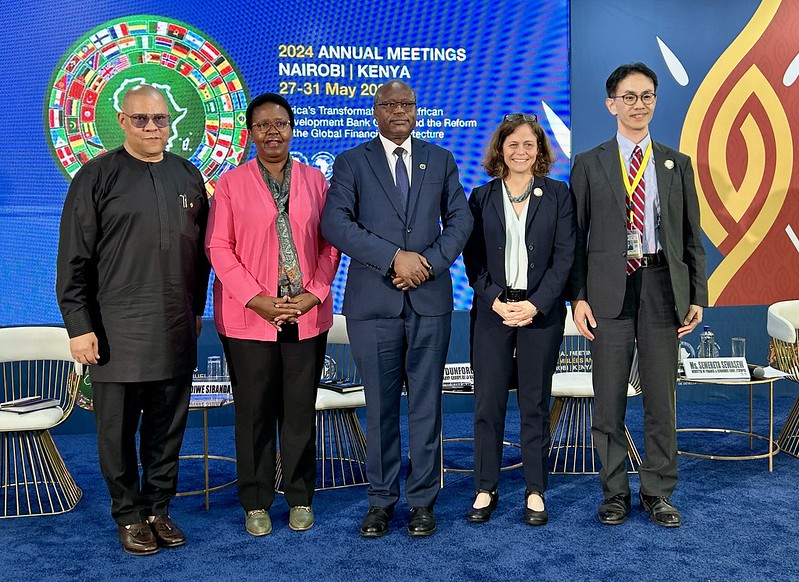
Partnerships for food system transformation
On Global partnerships and technology dissemination for food, land, and water systems in a climate crisis, Dr Simeon Ehui emphasized the critical role of science and technology in addressing the challenge of feeding a growing population by 2050.
He highlighted CGIAR’s efforts in developing agricultural technologies and stressed the importance of partnerships with national programs, regional organizations, and the private sector to disseminate these technologies to smallholder farmers effectively.
The IITA DG and CGIAR Regional Director for Africa lauded the bank’s support for the TAAT Programme which has facilitated the dissemination of CGIAR technologies to over 12 million farmers across Africa. Dr Ehui further solicited more innovative partnerships aimed at scaling up innovations using the TAAT model.
Dr. Paulin Basinga discussed the role of philanthropic organizations in supporting agricultural development. He highlighted the Gates Foundation’s focus on leveraging technology and innovation to improve agricultural productivity and resilience. Additionally, he emphasized the importance of partnerships between philanthropic organizations, research institutions, and governments in achieving sustainable agricultural development goals.
On Gates Foundation’s role in agricultural innovation and development, Dr. Paulin Basinga highlighted the Africa Gates Foundation’s strategy in supporting technological innovation and agricultural development across Africa. He emphasized their approach of catalytic philanthropy, leveraging partnerships with CGIAR and other organizations to scale agricultural technologies.
The foundation focuses on advocating for agricultural innovation, deploying technical expertise, and catalyzing financing to accelerate the adoption of innovations by smallholder farmers. He also discussed their role in supporting national agriculture development plans and collaborating with both public and private sectors to achieve sustainable agricultural growth.
Dr. Canisius Kanangire focused on the role of the AATF in promoting agricultural innovations and technologies for agricultural transformation in Africa.
He highlighted AATF’s efforts in developing and disseminating technologies tailored to the needs of African farmers, with a particular emphasis on climate-resilient agriculture. He underscored the importance of partnerships in scaling up these innovations across the continent.
Dr. Canisius Kanangire outlined AATF’s mission of transferring agricultural technologies from research institutions to smallholder farmers in Africa. He emphasized partnerships with CGIAR and the African Development Bank, highlighting AATF’s role as a facilitator in bridging research and implementation.
He discussed initiatives like seed production and capacity building among farmers, facilitated through collaborations with private sector seed producers and farmer organizations. Dr. Kanangire underscored the importance of enhancing seed quality and agronomic practices to improve productivity and resilience among African farmers.
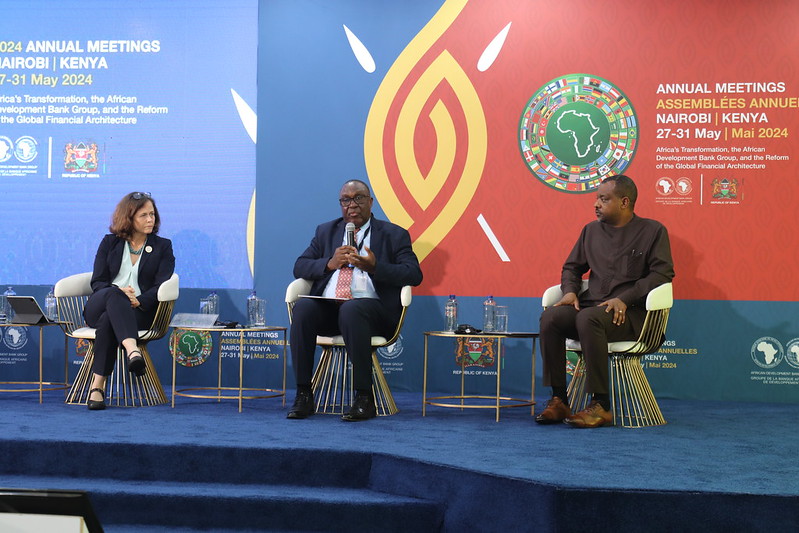
Innovations and strategies for agricultural transformation
Dr. Dave Watson, from FCDO (formerly DFID), discussed strategies implemented by African countries to enhance food security. He highlighted the importance of integrating sustainable agricultural practices and technologies into national policies and programs. He emphasized the role of advisory services in supporting smallholder farmers and promoting inclusive agricultural growth across Africa.
Dr. Éliane Ubalijoro emphasized the role of forestry research and agro-forestry in promoting sustainable development. She discussed ICRAF’s initiatives in developing climate-smart technologies and providing valuable data to support decision-making in the agriculture and forestry sectors.
She highlighted the importance of interdisciplinary research and partnerships in addressing global land use and climate change challenges.
The moderator facilitated discussions, focusing on the UK’s vision for CGIAR’s future and the transformative impact of technologies in African agriculture. They highlighted CGIAR’s pivotal role in leading Africa’s agricultural advancements through strategic partnerships and technological innovations.
Dr. Watson emphasized their steadfast support for the unified CGIAR system. Drawing on extensive experience, including years spent with various CGIAR centres, he underscored CGIAR’s achievements in germplasm and its current focus on sustainable agricultural intensification.
Dr. Watson advocated for translational research, interdisciplinary collaboration, and equitable partnerships to tackle challenges like malnutrition and climate change in Africa.
Dr. Eliane Ubalijoro highlighted the indispensable role of trees and forests in fostering sustainable agricultural ecosystems. She stressed the significance of integrating trees into farming practices to enhance soil health and productivity.
The CEO shared CIFOR’s initiatives in promoting green tree commodities and forging partnerships with the private sector to scale up sustainable agricultural practices. She advocated for science-driven solutions and increased investment in climate resilience and nature-based approaches to ensure robust economic growth and environmental sustainability across Africa.
In the final segment of this panel discussion, the moderator opened the stage to the audience for questions and responses from the panellists. The first question was directed towards technology solutions for Cameroon, highlighting challenges with government understanding and support for new technologies in agriculture, particularly in livestock.
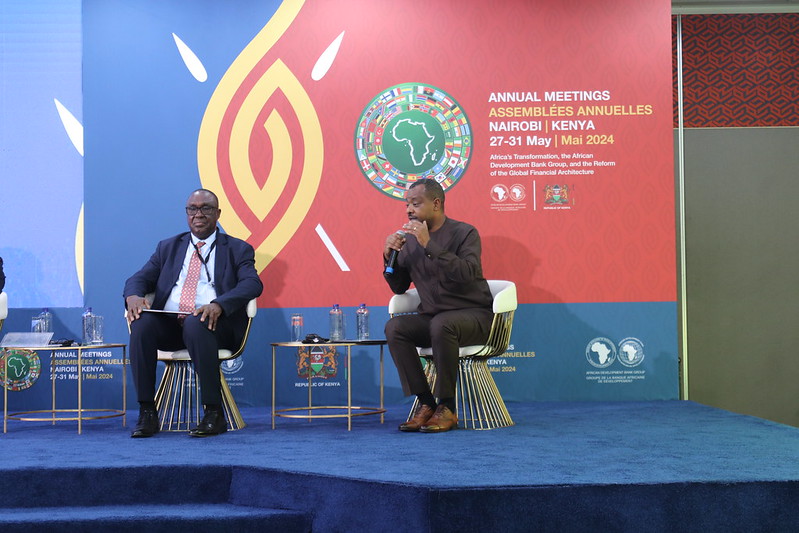
Another focused on the role of youth in agriculture, seeking insights from the panel on developing scalable financial systems to enhance credit facilities for youth-led agricultural initiatives in Africa. The final inquiry was about philanthropic initiatives and programs supporting youthful farmers accessing information and financial resources to grow their agricultural businesses and create employment.
Dr Ehui addressed the issue raised from Cameroon regarding technology solutions. He discussed CGIAR’s recent engagements with Cameroon and plans for regional projects, particularly focusing on improving the seed system in Central Africa to enhance agricultural productivity.
Dr Basinga responded to the question about financial systems for youth in agriculture, emphasizing strategic partnerships with development banks and governments to integrate agricultural innovations into national plans, thereby facilitating access to funding and scaling up innovations.
Prof Sibanda provided insights into the challenges faced by young farmers, advocating for innovative financial mechanisms that consider youth as assets and facilitate their entry into agriculture. She highlighted the importance of blended finance models and supportive policies to sustain youth participation in agriculture.
Dr Dunford summarized the panel discussion, emphasizing the need for scaling agricultural technologies across Africa, particularly to benefit youth. She emphasised the role of CGIAR and the African Development Bank in fostering agricultural innovation and ensuring sustainable food systems in the continent.
The panel discussion highlighted CGIAR’s pivotal role in advancing Africa’s agriculture through strategic partnerships and technological innovations.
Emphasising integrated approaches, CGIAR and its partners are committed to fostering sustainable development by collaborating with governments, research institutions, philanthropic organizations, and the private sector.
The urgent call to empower youth in agriculture was addressed with CGIAR’s efforts to integrate innovative financial mechanisms and supportive policies, recognizing youth as essential drivers of agricultural innovation and economic growth across the continent.
Continued investment in science-driven solutions, equitable partnerships, and robust support for youth are crucial to ensuring a secure and sustainable food future for Africa.


